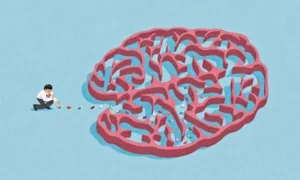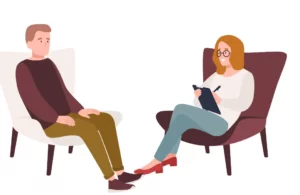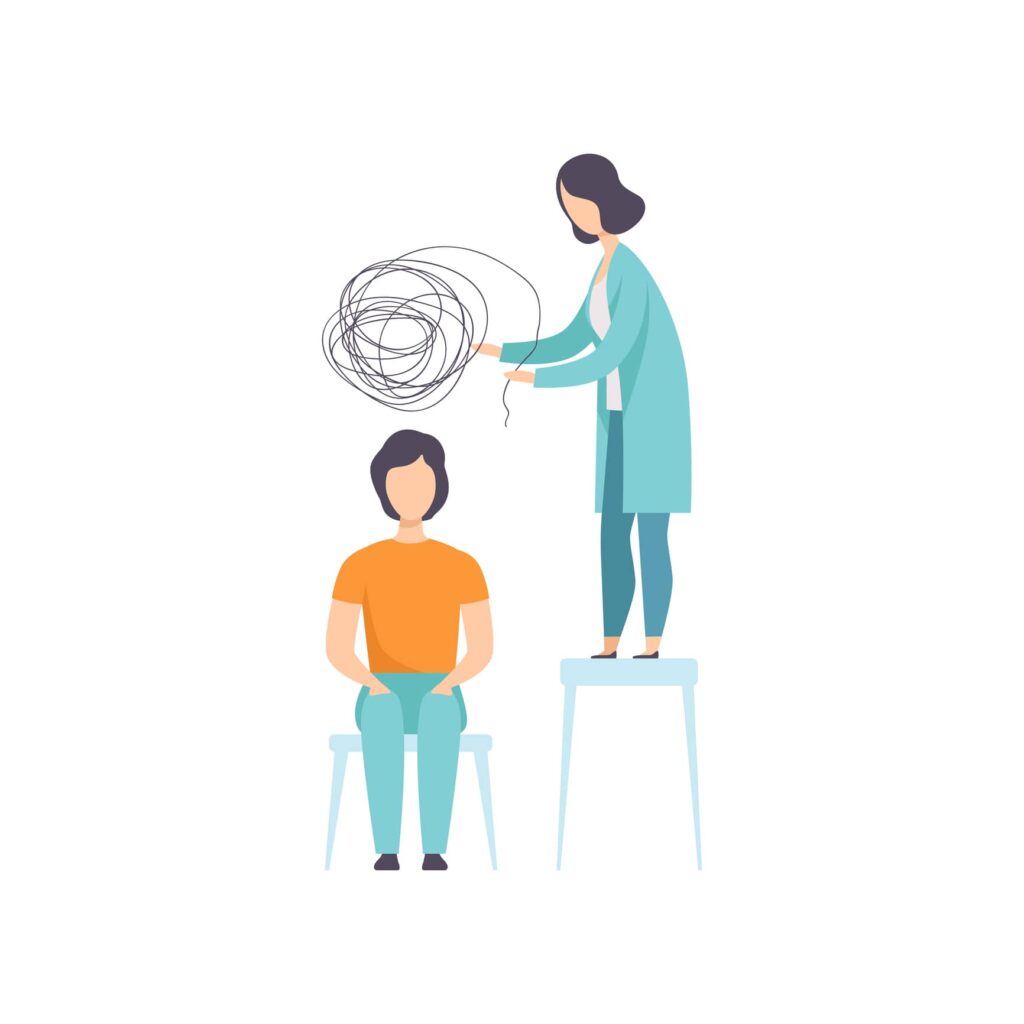Depression is a serious mental illness that can cause a lot of pain and suffering for the people who experience it. If you are one of the millions of people who suffer from depression, it is important to find the right psychiatrist. There are many psychiatrists out there, so how do you know which one is right for you? In this comprehensive guide, we will discuss everything you need to know about finding the right psychiatrist for depression. We will cover topics such as choosing a therapist, asking for referrals, and what to look for in a psychiatrist.
Contents
Who Is A Psychiatrist For Depression?

A psychiatrist is a medical professional who specializes in the diagnosis and treatment of mental health conditions. Psychiatrists are able to prescribe medications and provide therapy. They can also provide referrals for other services, such as support groups or psychiatric hospitals. They are certified and licensed to diagnose, treat, and manage mental health conditions.
A psychiatrist for depression is a medical professional who specializes in the diagnosis and treatment of mental health conditions related to depression. Psychiatrists are able to prescribe medications and provide therapy. They can also provide referrals for other services, such as support groups or psychiatric hospitals.
It is important to note that psychiatrists are different from psychologists. Psychologists are not medical doctors and cannot prescribe medication. They can provide therapy and counseling, but they do not have the same level of training as psychiatrists.
When To See A Psychiatrist?
Depression is a mood disorder that can cause a person to feel sad, hopeless, and lose interest in activities. It can also lead to physical problems, such as fatigue and sleep problems. Depression is a serious condition that requires treatment from a mental health professional.
If you are experiencing any of the following symptoms, it may be time to see a psychiatrist:
- Feeling sad or down most of the time
- Loss of interest in things you used to enjoy
- Difficulty sleeping or sleeping too much
- Fatigue or low energy
- Changes in appetite
- Feelings of worthlessness or guilt
- Trouble concentrating or making decisions
- Thoughts of death or suicide
These are just some of the signs that you may be suffering from depression. It is important to talk to your primary care doctor or a mental health professional if you are experiencing any of these symptoms.
What Does A Psychiatrist Do?

If you decide to see a psychiatrist for depression, they will first do a psychiatric evaluation. This evaluation will help them to determine if you are suffering from depression or another mental health condition. The evaluation will also help the psychiatrist to determine the severity of your depression and what treatment options are available.
Depending upon your condition, they may also order some physical tests such as blood work or a brain scan. These tests can help to rule out other physical causes for your symptoms.
After the evaluation, the psychiatrist will develop a treatment plan for you. This treatment plan may include medication, therapy, or a combination of both. Medication can be used to treat the symptoms of depression. Therapy can help you to understand and manage your depression. Sometimes in extremely severe cases of depression, the psychiatrist may recommend hospitalization. This is for cases wherein the patient is a danger to themselves or others.
Techniques Used
A psychiatrist uses multiple interventions to help their patients. The most common interventions are medication and psychotherapy.
Medication
Medication is often used to treat the symptoms of depression. Prescription medicines can be helpful in stabilize mood, relieve anxiety, and improve sleep. It is important to note that medication is not a cure for depression. It is only meant to help with the symptoms.
There are many different types of medications used to treat depression. The most common ones include:

- Selective serotonin reuptake inhibitors (SSRIs): Fluoxetine (Prozac), Sertraline (Zoloft), Paroxetine (Paxil), Fluvoxamine (Luvox)
- Serotonin and norepinephrine reuptake inhibitors (SNRIs): Venlafaxine (Effexor), Desvenlafaxine (Pristiq), Duloxetine (Cymbalta), Levomilnacipran (Fetzima)
- Monoamine oxidase inhibitors (MAOIs): Phenelzine (Nardil), Isocarboxazid (Marplan), Tranylcypromine (Parnate)
- Tricyclic antidepressants (TCAs): Amitriptyline (Elavil), Imipramine (Tofranil), and Nortriptyline (Pamelor).
- Atypical antidepressants: Bupropion (Wellbutrin), Mirtazapine (Remeron), Trazodone (Desyrel), Nefazodone (Serzone), Vilazodone (Viibryd).
Your psychiatrist will work with you to find the best medication for your needs. It is important to take the medication as prescribed and to not skip doses. Skipping doses can make the medication less effective.
It is also important to talk to your psychiatrist about any side effects you may be experiencing from the medication. Some common side effects of antidepressants include:
- Nausea
- Dry mouth
- Anxiety
- Insomnia
- Drowsiness or fatigue
- Sexual side effects
- Weight gain or loss
- An increase in suicidal thoughts
If you are experiencing any of these side effects, it is important to talk to your psychiatrist. They may be able to adjust the dosage or switch you to a different medication.
It is also very important to remember that it can take several weeks for antidepressant medication to start working. You may also need to try multiple medications before finding one that works for you.
Psychotherapy
Psychotherapy is a type of counseling that helps people to understand their thoughts and feelings. It can also help people to learn new skills for managing their emotions. Psychotherapy can be done in individual or group sessions.
The ultimate goal of therapy is to help people to improve their quality of life. This can be done by helping people to:
- Identify and manage their symptoms
- Handle stress and conflict
- Improve their relationships
- Develop healthy coping skills
- Set realistic goals
There are many different types of therapy. The most common ones used to treat depression include:
- Cognitive behavioral therapy (CBT): CBT helps people to identify and change negative thinking patterns.
- Dialectical behavioral therapy (DBT): DBT helps people to develop healthy coping skills.
- Eclectic therapy: Eclectic therapy is a type of therapy that uses elements from multiple types of therapies.
- Interpersonal therapy (IPT): IPT helps people to understand and improve their relationships.
- Psychodynamic therapy: This type of therapy explores the unconscious mind.
- Expressive therapy: This type of therapy uses art, music, or writing to express emotions.
- Narrative therapy: This type of therapy uses storytelling to help people make meaning of their lives.
- Humanistic therapy: This type of therapy focuses on self-awareness and personal growth.
- Problem-solving therapy: This type of therapy helps people to find solutions to their problems.
Your psychiatrist will work with you to find the best type of therapy for your needs. They may also refer you to a therapist or counselor who specializes in treating depression.
It is important to remember that therapy takes time and effort. You will need to be open and honest with your therapist. You may also need to practice the skills you learn in therapy outside of sessions.
Hospitalization
This is usually a last resort, but sometimes people with depression need to be hospitalized. This is usually done if someone is in danger of harming themselves or others. hospitalization can also help people who are not responding to other treatment options.
During hospitalization, you will be closely monitored by a team of doctors and nurses. You will also have access to psychiatric care and therapy. Hospitalization can be very helpful for people who are in a crisis. Some of the interventions used during hospitalization include:
- Individual therapy
- Group therapy
- ECT, TMS, DBS, TDCS
- Medication management
- Family therapy
- Activity groups
- Recreational therapy
- Nutritional counseling
- Aftercare planning
- Discharge planning
However, it is important to remember that hospitalization is not a cure for depression. It is only meant to provide short-term relief from symptoms. After being discharged from the hospital, you will still need to continue with outpatient treatment.
Referral Services
A psychiatrist may also provide referral services to other mental health professionals, such as psychologists or counselors. They may also refer you to support groups or psychiatric hospitals if necessary. This is done in order to ensure that you are getting the best possible care.
Some of the professionals you might get referred to include:
- Psychologists: Psychologists are mental health professionals who provide counseling and therapy. They can also conduct psychological evaluations.
- Counselors: Counselors are mental health professionals who provide therapy. They can also help you to develop coping skills and manage your symptoms.
- Support groups: Support groups are a great way to connect with others who have similar experiences. They can offer emotional support and practical advice.
- Psychiatric hospitals: Psychiatric hospitals are usually reserved for people who need more intensive treatment, such as those who are suicidal or homicidal.
- Neurologists: Neurologists are medical doctors who specialize in the nervous system. They can provide medication management and other treatments for depression.
You should always feel free to ask your psychiatrist for a referral if you feel like you need more help.
These are the techniques and interventions that a psychiatrist may use for depression. The plan of action will be different for everyone. The most important thing is to find a psychiatrist that you trust and feel comfortable with. They should be able to provide you with the help and support you need to recover from depression.
Choosing A Psychiatrist For Depression

Now that you know a little bit more about psychiatrists and what they do, it is time to start looking for one. When choosing a psychiatrist, there are a few things you should keep in mind.
Referrals
This is the first step in finding a qualified psychiatrist. Talk to your primary care doctor or any other mental health professionals you may be seeing. Ask them for referrals to psychiatrists in your area. You can also ask friends or family members if they know of any good psychiatrists. You may also use the internet to find psychiatrist referrals.
Check Your Insurance
Another important thing to consider is whether or not your insurance will cover the cost of seeing a particular psychiatrist. Not all insurance plans cover mental health services, so it is important to check with your insurer before making an appointment. If not, you can try other ways to figure your costs, such as using a sliding fee scale.
Research
Once you have a list of potential psychiatrists, it is time to do some research. Look up each one online and read their reviews. You should also check their credentials to make sure they are qualified to treat depression. You must also make sure of the fact that the psychiatrist you choose specializes in treating depression. They must also fulfill the specific legal and formal requirements such as having a license in your state and adequate educational credentials and experience.
Make A List Of Questions
When you have narrowed down your list, it is time to make an appointment with each psychiatrist. Before you go, make a list of questions to ask about the overall treatment approach. Some of the questions you may want to ask include:
- How do you diagnose depression?
- What is your treatment approach?
- Do you use medication, therapy, or a combination of both?
- What are the side effects of the medication you prescribe?
- Are there any other risks associated with the treatment approach?
- What are your success rates in treating depression?
- What is your experience in treating depression?
- How long will it take for the medication to work?
- What are the risks and benefits of taking medication for depression?
- What are your fees and do you accept my insurance?
After asking these questions, you should be able to narrow down your list even further. You can then make a decision about which psychiatrist is right for you. A qualified psychiatrist can provide the treatment needed to improve your quality of life. Remember to keep these tips in mind when choosing a psychiatrist and always ask plenty of questions.
Evaluate comfort
In addition to treatment and credentials, you also want to evaluate comfort. This is an important factor because you will be sharing sensitive information with your psychiatrist. You need to feel comfortable enough to talk openly and honestly about your feelings, thoughts, and experiences. If you don’t feel comfortable with the psychiatrist, then it’s probably not the right match for you.
Asking these questions and evaluating comfort will help you to choose the right psychiatrist for depression. Remember that treatment takes time, so don’t give up if you don’t see results immediately.
All of these criteria will help you in your search for a qualified psychiatrist who can treat depression. With the right treatment, you can improve your quality of life. Do not hesitate to ask for help if you are feeling depressed. There is no shame in seeking out mental health services. Help is available and there are people who care about you and want to see you get better.
What to Expect During Your First Appointment?
After finalizing on a psychiatrist, comes the time of your first appointment. This can be a daunting task, especially if you have never been to see a mental health professional before. Here are a few things you can expect during your first appointment:
- The psychiatrist will likely ask you about your symptoms, thoughts, feelings, and behaviors.
- They may also ask about your family history of mental illness.
- You will also be asked about any medications you are currently taking.
- Be prepared to answer questions about your sleep habits, appetite, energy level, as well as concentration.
- The psychiatrist may also want to talk about your work or school performance and any recent life changes.
- You may be asked to fill out some paper work prior to the meeting. This is often called an intake assessment or questionnaire.
- After the meeting, the psychiatrist will likely have a better understanding of your symptoms and may make a diagnosis.
- The psychiatrist may also recommend treatment options at this time. Treatment for depression can vary depending on the severity of the illness. In some cases, medication may be recommended. In other cases, therapy may be recommended.
The most important thing to remember is that you are not alone in this process. Help is available and there are people who want to see you get better. With the right treatment, you can improve your quality of life. Do not hesitate to ask for help if you are feeling depressed.
Conclusion
In conclusion to the above, a psychiatrist for depression is one of the most important medical professionals you will see. Do not be afraid to ask for help and make sure to do your research so that you can find the best possible psychiatrist for your needs. With the right treatment, you can improve your quality of life.
If you or someone close to you is in need of mental health services, please don’t hesitate to reach out to Mantra Care. We have a team of expert and professional psychologists and psychiatrists offering premium quality mental health services via online mode at affordable rates. You can visit our website to book an online therapy session or download our free Android or iOS app for more information!


